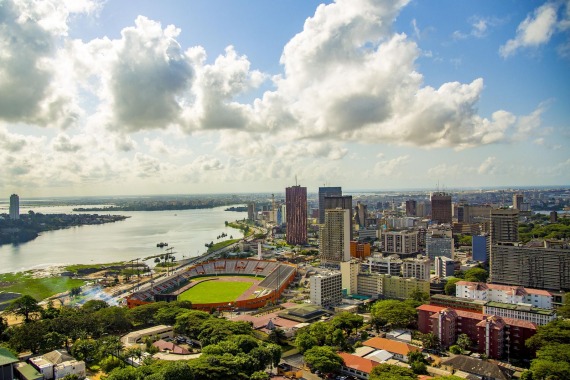Warnings & Dangers in Ivory Coast

OVERALL RISK : MEDIUM
Ivory Coast has an average crime rate. The country is quite poor, high unemployment - all this affects the crime rate. In this country, you always need to keep track of your things and your surroundings. Do not lose your vigilance.

TRANSPORT & TAXIS RISK : MEDIUM
Public transport is not safe, and it is not recommended to use it for transportation. Buses often attack and robbery. Use your car or taxi. Call a cab only from the licensed service on your smartphone, or recommended at your hotel. Make sure that the driver turns on the taximeter.

PICKPOCKETS RISK : HIGH
Pickpockets are the country's main problem. You can come across them anywhere; moreover, tourists are their goal. Keep track of your belongings and pockets, especially in crowded places. Be vigilant at crossroads - criminals can grab your bags from your hands while driving on a moped. Always keep an eye on your surroundings.

NATURAL DISASTERS RISK : MEDIUM
Natural hazards include the heavy surf and the lack of natural harbors on the coast; during the rainy season, torrential flooding is a danger. Explore the natural conditions of the country before your trip here.

MUGGING RISK : MEDIUM
Grave armed robberies in Ivory Coast are rare. Although in disadvantaged areas of cities of this country this can happen. Be vigilant; do not walk alone late at night and will remain safe.

TERRORISM RISK : MEDIUM
Terrorists are likely to attempt attacks in Côte d'Ivoire. The main threat in Côte d'Ivoire comes from al-Qaeda in the Islamic Maghreb (AQ-M) and related groups. These groups continue to strive to demonstrate their capabilities and strengthen their influence in the region. Do not participate in mass gatherings and political rallies.

SCAMS RISK : HIGH
The risk of falling into the hands of fraudsters is very high. In this country, scammers try to fool tourists at every step. Always double-check everything several times, buy services and goods only in licensed stores and travel services. Withdraw money only at ATM with banks with security.

WOMEN TRAVELERS RISK : HIGH
Women traveling alone should not go to Ivory Coast themselves. The country is very unsafe for travelers. Take care of the company, preferably from men from your own country. And avoid contact with local young guys, especially in bars and late at night.
How Safe Is Ivory Coast for Tourists?
Ivory Coast is a medium-security country.
The main problems here are related to petty crimes, robberies, theft of personal belongings, hacking of houses, and cars.
A very high level of corruption and bribery.
Some areas of the Ivory Coast are currently vulnerable to extortion by the security forces.
All kinds of security force (army, police, gendarmes) establish illegal checkpoints where they stop cars and minibusses, and either find or create a reason for requesting money from the driver or his passenger.
Most of the crimes committed in Abidjan, the country’s capital, are determined by unemployed youth.
Do not trust young people, especially men, if they offer or ask for help.
As a rule, Ivorians recognize the danger to foreigners in their own country and often protect very naive travelers.
This is especially true in the Abidjan Treyhville and Ajama areas.
If you are driving at night, do not stop completely at the lights or signs.
Beware of potential car jackets.
Keep up the pace, so you are not hijacked.
The country has a high unemployment rate, so prostitution has become legal.
But only the exchange of sex for money and only between adults (aged 18 years and older).
And Ivory Coast has become a popular destination for sex tourism.
However, hiring a prostitute in Côte d’Ivoire is highly not recommended, due to the high level of HIV / AIDS.
Do I Need a Visa to Visit Ivory Coast?
Visitors to Ivory Coast must obtain a visa from one of the Ivorian diplomatic missions unless they come from one of the visa-exempt countries. All visitors must hold a passport valid for six months.
Which Currency Is Used in Ivory Coast?
The West African CFA franc is the official currency of Ivory Coast. The franc is nominally subdivided into 100 centimes but no centime denominations have been issued.
How's the Weather like in Ivory Coast?
The best times to visit the Ivory Coast for ideal weather are December to March. Average temperatures in the Ivory Coast vary very little and the weather feels hot all year with a fair chance of precipitation about half of the year.
What Do I Need to Know about Airports in Ivory Coast?
Félix-Houphouët-Boigny International Airport, also known as Port Bouët Airport, is located 16 km southeast of Abidjan, Ivory Coast. It is the largest airport in the country for air traffic. The airport is the main hub of the national airline Air Côte d’Ivoire.
Should I Get Travel Insurance for My Travels?
Just like anywhere else, the travel insurance policy is a must when visiting a foreign country. Make sure you got it before starting your journey, the customs officer may ask for it.
What Are Some Things to Do in Ivory Coast?
Côte d’Ivoire is a country in West Africa, known for its beach resorts, rainforests, and French colonial heritage. The largest city in the state, Abidjan, is located on the Atlantic coast. Here are the concrete Pyramid and St. Paul’s Cathedral – an unusual structure, part of which is a massive cross in front of the facade. North of the business center of the city is the Banco National Tropical Reserve, with numerous hiking trails.
Is the Water in Ivory Coast Safe to Drink?
Tap water in the Ivory Coast is not safe to drink. Boil it, filter or disinfect tap water before drinking, or buy bottled water.
Is Uber Safe in Ivory Coast?
Uber service is available on the Ivory Coast. The fare will depend on the time of day and distance. The cost is deducted immediately from the credit card.




